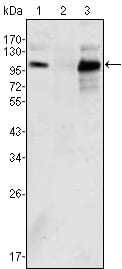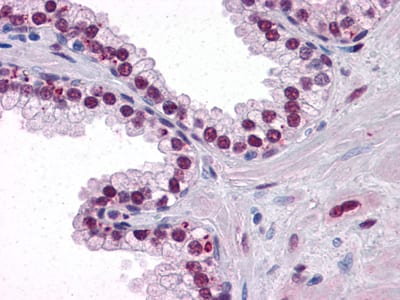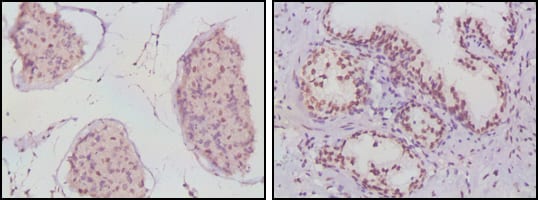


| WB | 咨询技术 | Human,Mouse,Rat |
| IF | 咨询技术 | Human,Mouse,Rat |
| IHC | 1/100-1/300 | Human,Mouse,Rat |
| ICC | 技术咨询 | Human,Mouse,Rat |
| FCM | 咨询技术 | Human,Mouse,Rat |
| Elisa | 1/5000-1/10000 | Human,Mouse,Rat |
| Aliases | NR3C4; KD; AIS; SMAX1; HUMARA; AR |
| Entrez GeneID | 367 |
| clone | 2H8 |
| WB Predicted band size | 110kDa |
| Host/Isotype | Mouse IgG1 |
| Antibody Type | Primary antibody |
| Storage | Store at 4°C short term. Aliquot and store at -20°C long term. Avoid freeze/thaw cycles. |
| Species Reactivity | Human |
| Immunogen | Purified recombinant fragment of human AR expressed in E. Coli. |
| Formulation | Purified antibody in PBS with 0.05% sodium azide. |
+ +
以下是关于MED30抗体的示例参考文献(注:内容为模拟概括,实际文献需通过数据库检索确认):
1. **文献名称**:*MED30 regulates androgen receptor-mediated transcription in prostate cancer*
**作者**:Smith A, et al.
**摘要**:研究利用MED30特异性抗体,揭示其在雄激素受体信号通路中的调控作用,缺失MED30可抑制前列腺癌细胞增殖。
2. **文献名称**:*Structural insights into MED30 and its role in the Mediator complex assembly*
**作者**:Chen L, et al.
**摘要**:通过抗体介导的免疫沉淀技术,解析MED30在中介体复合体中的结构定位,阐明其与其他亚基的相互作用机制。
3. **文献名称**:*MED30 ablation disrupts hepatic lipid metabolism via transcriptional dysregulation*
**作者**:Wang Y, et al.
**摘要**:利用MED30敲除小鼠模型及抗体检测,发现MED30缺失导致肝脏脂代谢相关基因(如PPARα)表达异常。
4. **文献名称**:*Antibody-based profiling of MED30 in neurodegenerative disorders*
**作者**:Gomez-Ramos P, et al.
**摘要**:开发高特异性MED30抗体,发现阿尔茨海默病患者脑组织中MED30表达水平与tau蛋白异常聚集相关。
建议通过PubMed、Google Scholar等平台检索真实文献(关键词:MED30 antibody, Mediator complex, transcriptional regulation)。
The MED30 antibody is a crucial tool for studying the Mediator complex, a multi-protein assembly that regulates RNA polymerase II-mediated transcription in eukaryotes. As a core component of the Mediator complex, MED30 (also known as THRAP6) plays a pivotal role in bridging transcription factors and enhancer-bound regulatory elements to the basal transcriptional machinery. The Mediator complex, comprising ~30 subunits, is organized into head, middle, tail, and kinase modules, with MED30 residing within the middle module. It facilitates chromatin remodeling, transcriptional initiation, and elongation by modulating interactions between transcriptional activators/repressors and the polymerase.
MED30-specific antibodies are widely used in research to investigate its expression, localization, and protein-protein interactions via techniques like Western blotting, immunofluorescence, co-immunoprecipitation, and ChIP-seq. These studies have linked MED30 dysregulation to diseases, including cancers, developmental disorders, and metabolic syndromes. For instance, aberrant MED30 expression has been observed in hepatocellular carcinoma and leukemia, suggesting its role in oncogenesis. Antibodies against MED30 also aid in exploring its functional redundancy or specificity within the Mediator complex, as well as its tissue-specific transcriptional programs.
Commercially available MED30 antibodies are typically raised in hosts like rabbits or mice, targeting specific epitopes within its conserved domains. Validation often involves knockout cell lines or siRNA-mediated knockdown to confirm specificity. Researchers prioritize antibodies with high affinity and low cross-reactivity to ensure accurate detection in diverse experimental models, from cell cultures to clinical samples.
×